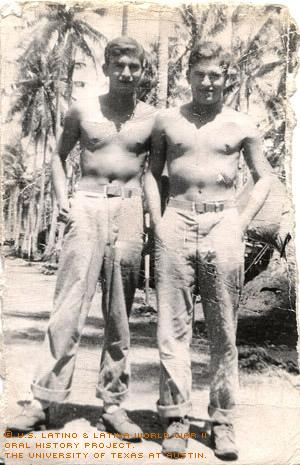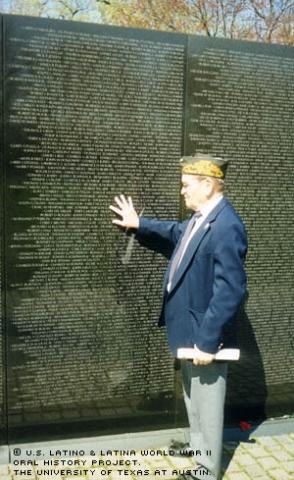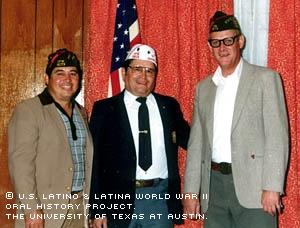


By Unity Peterson
A self-described "little fighter" in grammar school, Manuel "Manny" Rivas often got himself and his twin brother, Sal, into trouble. Since the schoolteachers couldn't tell the boys apart, they were both punished with whacks across their behinds.
Years later, that fighting spirit helped the twins as Marines during World War II.
Rivas, and his twin brother, Salvador, were born in El Paso on June 3, 1925, as the second-to-the-oldest children in their family. Growing up during the Depression, Rivas remembers most families struggling to make a living and keep food on the table. His father, Salvador Rivas, was a paper cutter at a printing company. His mother, Lydia Miranda, was a homemaker, taking care of her four children.
Rivas attended Burleson grammar school, the site of his early mischief.
"I was a little fighter, always getting into fights with everybody," Rivas said.
He and Sal worked after school cleaning bathrooms, wiping chalkboards and sweeping floors to make extra money -- $15 a month -- for their family. The job was part of a federal National Youth Administration program, designed to give low-income high school and college students part-time jobs to keep them in school.
The Rivas family moved to Los Angeles in 1941 in search of a better life. But when the Japanese attacked Pearl Harbor in 1941, they quickly packed up and headed home to El Paso, where they registered six months later on their 17th birthday. The brothers didn’t graduate high school, but got their diploma in 1991, 50 years later, from Bowie High School.
"We were like two peas in a pod. We were together all the time, everywhere. We even joined the Marines together," Rivas said.
They soon headed off to boot camp in San Diego, where life was drastically different. The day began at 5 a.m., with training to "Kill! Kill! Kill! For our country," he said.
From San Diego, Rivas was shipped to New Caledonia, where he was placed in the 39 Replacement Battalion of the 1st Marine Division. After fighting in New Guinea, New Britain and Cape Gloucester, the marines arrived in the Solomon Islands to rest and get new men to replace those who’d been wounded or killed.
On Sept. 15, 1944, the twins were among the second wave of Marines to hit the beach of Peleliu for an invasion they believed would last three days. Instead, they were there three months. The brothers fought in different platoons during the day, but sometimes shared a foxhole.
Any time Rivas would come across someone who knew Sal, he’d ask: "Where's my brother? Where's my brother?"
He says he always feared Sal had been killed.
"The battle was like a living hell," he wrote to the Project after his interview.
One evening, Sal was sent on patrol with four other men and didn’t return for three days. The lieutenant surmised they were most likely dead. Rivas, however, knew this wasn’t true and went searching for his brother, accompanied by other Marines.
"With my 'twin instinct,' I took two guys with me and we found them. … They were behind enemy lines and we got 'em out," Rivas said. "My instinct, like a homing pigeon's, brought me to my brother.”
Soon after Peleliu, the Rivas twins and their fellow Marines headed for Okinawa, the largest battleground in the Pacific, where they fought from April 1 to June 22, 1945, with the 4th Joint Assault Signal Co. Rivas went in hours before sunrise, as a security guard to protect the Marines, directing them away from the hidden Japanese landmines and snipers.
Rivas recalls the massive bloodshed on both sides as the American marines made their way across the island.
"We had to walk over bodies. … We had to sleep with bodies. They were stinking, and there were maggots," said Rivas, adding that he and his brother were constantly looking for each other during the battles.
On June 22nd, 1945, Japanese resistance on Okinawa ceased, but the war wasn’t yet over for Rivas and his fellow Marines.
The Commander General informed them that their division was to lead all troops into Tokyo Bay, where it was estimated that 80 percent of the men would be wounded or killed within the first 20 minutes of battle. Just before the invasion, the atomic bomb was dropped and the weary and anxious marines celebrated the end of the war.
But the twins weren’t to return home right away. Instead, they were stationed in China, where they were responsible for helping rid the country of Japanese soldiers. Rivas spent 9 months in China after the war.
In May of 1946, the brothers returned to San Diego and began making their way back home to El Paso, where they stopped at a church before heading straight to "Mama's house."
Rivas used the GI Bill to earn a diploma in accounting from the International Business College in El Paso. He worked for county schools for a few years and then took a job as a counselor for the U.S. Department of Veterans Affairs, where he remained for more than 30 years. Sal, who’d eventually get married and have three children, began working in the optical business and later opened his own company.
Rivas met Laura Garcia at the VFW Post in 1947; the two were married two years later. They have a son, Adrian M. Rivas, and two grandchildren.
Rivas has remained active in the Veterans of Foreign Wars for nearly six decades and has served in a variety of positions, including State Commander and the National Council of Administration. He and his wife have also been active in politics. In addition, Rivas was active in the Boys Scouts of America for 55 years; Sal was involved for 45 years until he passed away.
The war shaped Rivas' life forever and fortified the bond between him and Sal that has never been broken. He remembers how their father, now 106 years old and still active, hadn’t wanted the twins to join the same branch during the war in fear of losing them both. But Rivas still remembers his mother's words to him so long ago:
"They were born together. They've been to school together. They've had their fights together. Let them be together in the Marines."
"And we've been together ever since,” Rivas said. “When my brother Sal died, I lost a part of my soul."
Mr. Rivas was interviewed in El Paso, Texas, on February 2, 2002, by Christopher Nay.

